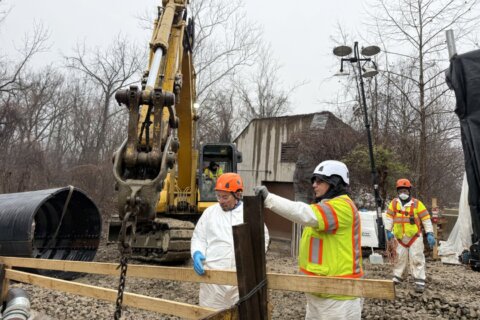Several groups representing businesses in Montgomery County, Maryland, have major doubts and mixed feelings about a proposed plan to mandate that restaurants, bars, fitness centers and other venues check customers’ COVID-19 vaccination status.
Montgomery County’s “vaccine passport” proposal, which is modeled on a similar effort in D.C. that launched last weekend, would be phased in over the course of about a month.
Starting Saturday — if approved by then — the program would require all customers 12 and older to show proof of having a first COVID-19 vaccine shot at certain establishments. Customers 12 and older would have to show proof of having received all doses — except booster shots — starting Feb. 15. Starting March 1, the requirement would apply to all customers 5 and older.
In testimony Tuesday before the County Council sitting as the Board of Health, business groups said the logistics would be too challenging for businesses to navigate and that the potential benefit of encouraging vaccination is outweighed by the costs, especially in a county with total vaccination rates that are already just shy of 85%.
Some groups said they worried about clashes with customers at the door, and that already short-staffed establishments would have to act essentially as vaccine “bouncers.” Under the regulation, the measure would be enforced by county agencies, including the Department of Health and Human Services Department as well as the Montgomery County Police Department.
Melvin Thompson, with the Restaurant Association of Maryland, said restaurants in the county have provided “mixed feedback” about the proposal, “and there are many questions that remain unanswered about the details.”
If the council moves forward with the proposal, he said, the regulations should make clear that businesses have the flexibility to check customers’ vaccine cards either at the door or inside at tables or ordering counters, and he said businesses should be given more time to prepare.
A council vote on the measure was tentatively scheduled for Jan. 25; however, another public hearing on the matter has been scheduled for that day, and it’s unclear whether the vote will still happen.
Mauricio Vasquez, who represents the Hispanic Chamber of Commerce of Montgomery County, said his group opposes the vaccine check regulation.
“At first glance, for many of us vaccine proponents, this legislation sounded like a good idea. But upon looking at the result in costly social and economic requirements, and a relatively low benefit, we must speak out against this proposed legislation,” Vasquez told council members.
Vasquez is worried about unfair enforcement of the measure, saying “unintended targeting of sensitive populations will inevitably ensue whether we intend it or not. The possibility exists and the legislation facilitates it.”
Jane Redicker, who represents the Greater Silver Spring Chamber of Commerce, said business owners there are skeptical the measure will boost vaccination rates all that much.
“But the biggest problem that they had was in the troubling logistics of implementation,” she said.
She pointed to the text of the regulation, which states that restaurants, bars and other venues covered by the order “must not permit a guest, visitor, or customer … to enter the indoor premises of the covered establishment or facility without displaying proof of vaccination.”
Redicker said: “That literally means you need a bouncer at the door. And that’s just not practical for somebody who already doesn’t have a bouncer at the door.” Business across the region are plastered in “help wanted” signs as they face staff shortages.
Businesses are also concerned about having to verify customers’ documents, Redicker said, or to verify that they qualify for a medical or religious exemption, as well as how to reasonably accommodate them as required by the regulations.
Monica Jefferies, with the Strathmore Music Center in North Bethesda, said the entertainment venue began requiring patrons to either provide proof of vaccination or a negative COVID-19 test result to enter starting in September.
Of 21,000 patrons screened, only about 0.5% have been denied admittance for failing to show proof of vaccination or a negative test, and staff and volunteers have rolled out the vaccine relatively smoothly, she said.
Still, the Strathmore has had to hire additional police presence as it rolled out the vaccine check.
“We have found it necessary to offer our staff de-escalation training and solutions planning and we have found it necessary to have MCPD and security personnel present to assist our civilian staff who are confronted with angry patrons — which does happen,” she said.
Earl Stoddard, assistant chief administrative officer for the county, said the goal of a vaccine check at restaurants and businesses is part of a broader strategy to help reduce transmission of COVID-19 in the county and “to encourage those who are unvaccinated” to get shots, including people who have only received one shot and are not considered fully vaccinated.
There is currently a 10% gap in the number of county residents who have received one dose vs. those who are fully vaccinated.
In addition to D.C., vaccine passports have been rolled out in several other cities across the U.S., including New York, Philadelphia and Chicago.
While D.C.’s mandate applies to customers over the age of 12, Stoddard said Montgomery County’s, once fully phased in, would apply to customers age 5 and older, specifically to boost lagging vaccination rates among younger children.








